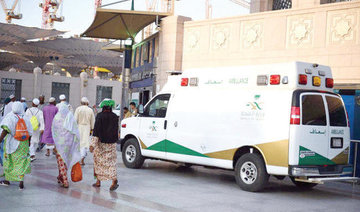MAKKAH: More than 7,000 men from government and national sectors are volunteering to serve pilgrims once they arrive at King Abdul Aziz International Airport in Jeddah.
The volunteers ensure pilgrims’ comfort and receive them with hospitality and generosity. Golf vehicles are available to transport the elderly. Using the latest technology, the volunteers serve pilgrims with honor and pride.
Meanwhile, the Ministry of Hajj and Umrah has launched the United Hajj e-system, which integrates and connects entities involved in serving pilgrims. Available in seven languages, it is the first system of its kind in the Middle East.
The ministry stressed the importance of expanding the use of technology to serve pilgrims from arrival until departure.
Furthermore, a group of Saudi women and girls have been devoting themselves for eight years to taking care of children who have become lost among the crowds in the holy city during Hajj.
Lina Abu Znadeh, the head of the women’s volunteer scout team for receiving and taking care of lost children during Hajj, confirmed in an interview with Al Arabiya that their teams have an integrated network connected to the Saudi police, hospitals and scouts to help reunite lost children with their loved ones as quickly as possible.
“The volunteers started their work eight years ago, working around the clock during Hajj season,” she said. “We receive lost children and give them all the psychological and moral support. We start by calming them down, because they are usually afraid and panicked. Then we give them a shower and let them change their clothes,” she added.
“The mechanism of reuniting children with their parents or relatives is organized with the relevant authorities operating in the field. First, we report to the state network any details about the lost child, identifying the child by name or by any specific characteristics. Parents come to our center and are reunited with their child, after all the necessary paper work. The child leaves our center with a bracelet containing their name and their parents’ contact numbers in case they get lost again,” said Abu Znadeh.
In the interview, Abu Znadeh revealed some of the obstacles they faced in the early years of their work, such as the difference of languages. However, this helped them become more experienced in finding immediate solutions.
She indicated that the number of lost children has decreased throughout the years due to the increasing awareness among parents. In the center’s first year of operation, 80 lost children were found against 64 children the following year. This number kept decreasing until last year, when there were only 26 lost children.
Abu Znadeh added: “We will start our around-the-clock field work this year Aug. 29 up and finish Sept. 5. Over the years, we had special needs children come to the center (Ex: autistic children), and thus we have now an autism specialist and a therapist on our team.”
Over 7,000 volunteers serve Hajj pilgrims at Jeddah airport
Over 7,000 volunteers serve Hajj pilgrims at Jeddah airport

Saudi artist brings themes of prayer and spirituality to life in Bahrain exhibition

- Artist’s late father inspired the display
- Photographs, digital art and videos portray scenes of prayer
RIYADH: An exhibition in Bahrain by Saudi artist Emtethal Al-Awami’s explored themes of memory, nostalgia, and the intersection of past and present.
“101 Hymns” featured photographs, digital art and videos portraying scenes of prayer, providing a rich and visually engaging experience.
Al-Awami, from Qatif, told Arab News the idea for the exhibition was inspired by her late father, whose actions and movements during prayer and tasbih she had observed throughout her life.
“The movement of his fingers between the beads of the prayer rosary and the sound of his voice reflected moments of serenity and reassurance, embodying feelings of forgiveness and harmony,” she said.
“The scene represents a deep connection with the self, offering a person the time to reflect and return to their true essence.”
The prayer rosary, a symbol of spirituality used across different religions and cultures for over 3,000 years, served as a tool to restore calm amidst the chaos and speed of everyday life, added Al-Awami.
“101 Hymns” sought to show how prayer and tasbih become a sanctuary in a world of pressures and challenges, opening the door to tranquility.
“By observing my father, I realized that these moments provide valuable lessons on patience and serenity, as the soft sound of the prayer beads soothes the soul and offers a deep sense of security,” she said.
After taking time to mourn and reflect following her father’s death around 18 months ago, the Saudi artist said she was determined to complete the project and present it in his honor.
“He was my inspiration and my first supporter, and this idea reflects my love and pride for his spiritual journey, which I aspire to share with others through this exhibit,” she told Arab News.
Al-Awami’s journey as an artist began at an early age with a deep fascination for art and its vast possibilities in various forms of expression. She studied art education at King Saud University in Riyadh, graduating in 1996.
“The initial spark of my artistic journey can be traced back to a specific moment of introspection as I observed the world around me — seeing the beauty in everyday life and realizing the power of visual storytelling,” she said.
She added she was inspired to commit to the pursuit of art as a form of synthesis between individual experiences and broader societal themes.
During her journey to becoming a professional artist, Al-Awami experimented with different styles and mediums which allowed her to progress and refine her voice, establishing her own artistic identity.
“I have learned to weave cultural narratives into my work, and my experiments with different styles and ideas enrich my artistic practice, allowing me to tell diverse stories through my art,” she explained.
As a Saudi artist, Al-Awami often highlights cultural narratives shaped by her own experiences. Arabian art is distinguished by its unique disposition, rooted in a rich history of spiritual, cultural and social chronicles, she said: “It embodies a fusion of traditional techniques with contemporary themes, continually reflecting the dynamic nature of Arab identity, resilience, and creativity across generations.”
Al-Awami emphasized the significant development the artistic community has seen in the Arab world, especially in Saudi Arabia.
Marked by increased recognition of contemporary artists and openness to diverse forms of expression, the Kingdom’s art scene is strongly supported by the government under the Ministry of Culture.
“The emergence of new platforms for showcasing art has revitalized the art scene, fostering collaborations that transcend geographical boundaries,” Al-Awami said.
“As a Saudi woman and artist, I feel a deep sense of responsibility to authentically represent my community. This journey requires overcoming challenges, yet it is rewarding to shed light on the arts and demonstrate that creativity and expression are equally important (as STEM) in enriching society.”
Crown Prince Mohammed bin Salman receives call from US Secretary of State Marco Rubio

RiDUBAI: Saudi Crown Prince Mohammed bin Salman received a phone call from US Secretary of State Marco Rubio on Thursday, Saudi Press Agency reported.
During the call, the two leaders reviewed bilateral relations between the Kingdom and the United States, discussing areas of mutual cooperation and ways to further enhance them.
They also addressed the latest regional and international developments and exchanged views on several issues of common interest.
KSrelief sends aid to thousands of Syria’s most in need

RIYADH: Saudi aid agency KSrelief has provided further relief to thousands in Syria, the Saudi Press Agency reported.
KSrelief distributed 98 food packages, 113 bags of flour, 15 winter kits and 15 personal care kits to those most in need in Al-Rastan city in Homs governorate.
The initiative benefited 538 people from 113 families as part of a relief material distribution project in Syria.
Meanwhile, 3,271 people from the most vulnerable families affected by the 2023 earthquake in the town of Jindires in Aleppo governorate received shopping vouchers.
They can be used to purchase winter clothing of their choice from approved stores, as part of a winter clothing distribution project in Syria.
Top Saudi university wins Japan Prize for marine ecosystem research

- KAUST’s Prof. Carlos Duarte, a biological oceanography and marine ecology academic, among prize recipients
- Kingdom solidifies its global standing in developing marine solutions to combat the effects of climate change
JEDDAH: The King Abdullah University of Science and Technology has been awarded the prestigious Japan Prize for its research into advancing the understanding of changing marine ecosystems and blue carbon.
The university’s achievement solidifies Saudi Arabia’s global standing in developing marine solutions to combat climate change, the Saudi Press Agency reported recently.
KAUST’s Prof. Carlos Duarte, a biological oceanography and marine ecology academic, is among the recipients of the Japan Prize. His groundbreaking work in marine ecology has earned him international recognition.

KAUST’s board of trustees’ secretary-general, Dr. Fahad bin Abdullah Toonsi, expressed pride in the university’s achievement, emphasizing its role in enhancing global understanding of marine ecosystems.
He highlighted Saudi Arabia’s efforts in sustainable climate-change solutions and marine conservation, a milestone reflecting KAUST’s commitment to excellence as a part of Saudi Vision 2030.
Established in 1985 and often referred to as the “Nobel Prize of Japan,” the honor is awarded annually to scientists who make exceptional innovations in science and technology that promote peace and prosperity for humanity.
Duarte will travel to Tokyo in April to receive the award from Japan’s Emperor Naruhito.
Drone Racing World Cup at Boulevard City begins with top prizes at stake

- 3-day event among myriad activities of ongoing Riyadh Season
- Contest is being held in Mideast, North Africa for the first time
RIYADH: Prizes exceeding $346,500 await the winners of the Drone Racing World Cup which begins on Thursday at Boulevard City in Riyadh.
Organized by the Saudi Federation for Cybersecurity, Programming and Drones, in collaboration with the World Air Sports Federation, the three-day event is a part of the ongoing Riyadh Season.
The competition is being held for the first time in the Middle East and North Africa region since its inception in 2016, the Saudi Press Agency reported recently.
This year’s edition will feature world champions including Kim Minjae and Yuki Hashimoto, winners of the 2024 FAI World Drone Racing Championship.
Also participating are Killian Rousseau, winner of the 2023 FAI Drone Racing World Cup; Luisa Rizzo, winner of the 2024 Women’s FAI Drone Racing Championship; and Min Chan Kim, winner of the 2023 FAI World Drone Racing Championship.
Several Saudi Arabia pilots will also compete including Muhannad Al-Wohaibi, Ibrahim Al-Sultan, Dalia Al-Safar, Al-Anoud Al-Shalaan, Bader Mutlaq Al-Raqas, Nawaf Al-Hamoud, and Salma Attallah Al-Aqbi.
The qualifying rounds will start on Thursday and continue until midday on Friday, followed by the finals on Saturday.
There will be various activities including a Drones Hub for teaching amateurs and professionals; a Drag Racing Zone for speed competitions on a straight path; and a Fly Free Zone designed for testing and operating drones.
In addition, there will be a VR Drone Racing simulation using virtual-reality glasses; workshops for training, designing, assembling and building drones; and a Fans Zone for those wanting to watch the competitions.


















